If you’re the right age (and that’s my age), you can almost understand my fascination with what’s happening in Moscow this week. For my generation, Red Square was the scene of enormous displays of Russian military might. I remember the dissection of the number of troops, missiles, and the speculation associated with which leader had risen, fallen, or vanished among the panoply of would-be Czars who threatened to bury us. That was the Cold War spectacle, when the Soviet Union would exercise its muscle as a superpower.
This week much of Moscow is making ready for a big parade on May 9th, 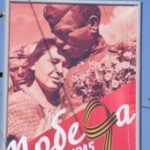 which marks an important date in Russian history–the end of the Great Patriotic War, as the Russians dub it, 65 years ago. The maelstrom that was World War II (and a stage on the way to that Cold War) ended, and Red Square is festooned for the 65th anniversary party.
which marks an important date in Russian history–the end of the Great Patriotic War, as the Russians dub it, 65 years ago. The maelstrom that was World War II (and a stage on the way to that Cold War) ended, and Red Square is festooned for the 65th anniversary party.
Unfortunately (or maybe fortunately), we’ll be in St. Petersburg for that holiday, and I understand it’s celebrated there, but not in the way it is in Moscow. After all, Moscow is the capital of Russia (at least since the Russian Revolution moved it here from St Petersburg).
I know we’ll be watching it on TV, and in the papers. It’s already blocked off Red Square (rats), which we were only able to view from a distance; we’re touring tomorrow, and I hope we can get closer!
We landed in Moscow yesterday, and have spent the major part of the last day and a half visiting companies. We went right from the airport to John 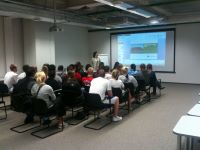 Deere’s new assembly plant/logistics warehouse near the airport. It’s a huge facility that we were able to visit because one of my former students, who went on a January trip in the mid 1990s with me, is now a lawyer for John Deere. The plant opened last week, so we were one of the first groups to tour it. The factory side assembles 2 styles of combines (parts come from elsewhere–especially Germany and the United States–but will probably be sourced locally eventually) for large farms. One interesting fact that we learned that I’ll use in my international business class is that the company reorganized last year more or less around similar customer groups, putting Australia in with the United States. The plant builds to order (if someone orders a combine, they assemble one), so there’s not a lot of inventory sitting around. By contrast, the logistics side is 13 layers high, piled with the inventory that might be needed to repair the John Deere equipment. As I told one of my accounting students, “that’s a lot of fixed costs” for the plant!
Deere’s new assembly plant/logistics warehouse near the airport. It’s a huge facility that we were able to visit because one of my former students, who went on a January trip in the mid 1990s with me, is now a lawyer for John Deere. The plant opened last week, so we were one of the first groups to tour it. The factory side assembles 2 styles of combines (parts come from elsewhere–especially Germany and the United States–but will probably be sourced locally eventually) for large farms. One interesting fact that we learned that I’ll use in my international business class is that the company reorganized last year more or less around similar customer groups, putting Australia in with the United States. The plant builds to order (if someone orders a combine, they assemble one), so there’s not a lot of inventory sitting around. By contrast, the logistics side is 13 layers high, piled with the inventory that might be needed to repair the John Deere equipment. As I told one of my accounting students, “that’s a lot of fixed costs” for the plant!
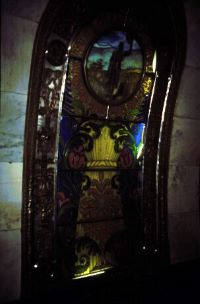 On the two visits today we went via subway, which is one of the showpieces of communist “art.” The subway was started in the 1930s, and built by Nikita Khrushchev with a lot of convict labor. Some of the metro stations are really elaborate, with statues to Soviet art (workers, peasants, soldiers). They were built partly as bomb shelters, so they’re pretty well underground, but move large numbers quite efficiently.
On the two visits today we went via subway, which is one of the showpieces of communist “art.” The subway was started in the 1930s, and built by Nikita Khrushchev with a lot of convict labor. Some of the metro stations are really elaborate, with statues to Soviet art (workers, peasants, soldiers). They were built partly as bomb shelters, so they’re pretty well underground, but move large numbers quite efficiently.
The two businesses we visited were quite different. One that Prof. Vitzthum arranged is a German company that has partnered with Gazprom, Russia’s state company that has a major share of natural gas both in Russia and in Europe.If you’ve been following the negotiations between the Ukraine and Russia, you’ll 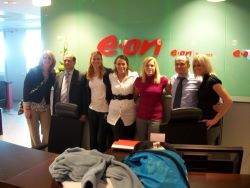 know that Gazprom is an arm of Russian foreign policy.The company we visited has also partnered with Gazprom to build the Nordstream gas pipeline from Russia to Germany on the floor of the Baltic Sea. We had the company’s view of what must have been (given the strength of the green parties in Europe) a difficult struggle to obtain the permits. As I understand it, the pipeline has been cleared environmentally, and will be begun soon.
know that Gazprom is an arm of Russian foreign policy.The company we visited has also partnered with Gazprom to build the Nordstream gas pipeline from Russia to Germany on the floor of the Baltic Sea. We had the company’s view of what must have been (given the strength of the green parties in Europe) a difficult struggle to obtain the permits. As I understand it, the pipeline has been cleared environmentally, and will be begun soon.
The other company we visited was Citicorp, which an alum who works here set up for us. What I found fascinating was his discussion of fostering the use of credit cards in what is essentially a cash-based economy. Partly because of the impending holiday, and partly because of the volatility of the world markets because of Greece’s debt crisis, the presentation seemed informative, but brief. The Russian economy fascinates the business literature, partly because the country is developing, but it is still a poor country (overall) whose economic health ebbs and flows on the prices of raw materials.
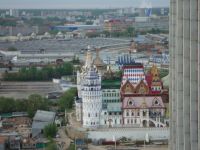
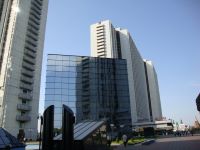 We’re staying at the Hotel Vega, which was part of a complex built for the 1980 Olympics. I stayed here in 2002, and fortunately, it doesn’t resemble my memory. Eight years ago, it resembled a monastery, or, as I thought at the time, a prison cell. It had bare lightbulbs and scant furnishings. I’m happy to report that it now looks like a hotel, and one much better than the 3-star ratings it has. At one time, its four towers made it the largest hotel in the world.
We’re staying at the Hotel Vega, which was part of a complex built for the 1980 Olympics. I stayed here in 2002, and fortunately, it doesn’t resemble my memory. Eight years ago, it resembled a monastery, or, as I thought at the time, a prison cell. It had bare lightbulbs and scant furnishings. I’m happy to report that it now looks like a hotel, and one much better than the 3-star ratings it has. At one time, its four towers made it the largest hotel in the world.
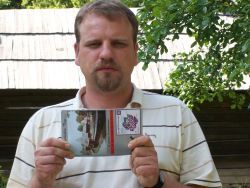 Sascha and I are about to leave for dinner with some friends of his, but I did want to wish everyone a happy Mother’s Day. I’ll write again after we’ve toured Moscow. We check out at 9 a.m., then tour, and take the overnight train to St. Petersburg at 10 p.m. As my brother said, “you better keep your track shoes ready for this trip.”
Sascha and I are about to leave for dinner with some friends of his, but I did want to wish everyone a happy Mother’s Day. I’ll write again after we’ve toured Moscow. We check out at 9 a.m., then tour, and take the overnight train to St. Petersburg at 10 p.m. As my brother said, “you better keep your track shoes ready for this trip.”